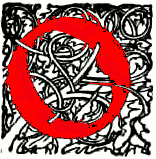
ne might almost conclude that the following poem was a parody of William Morris's The Dream of John Ball created under the influence of Thomas Carlyle's French Revolution — except that the utopian novel appeared two decades later. Like Carlyle, “The Dream of John Bright” argues that political reforms meant to redress injustices and introduce sensible, comparatively minor changes for the better end up disastrously. Since this is a comic poem in a satiric magazine it proceeds by using William Cowper’s “The Diverting History of John Gilpin Shewing how he went Farther than he intended, and came safe Home again” (1782) as the model for its political narrative. In that poem Gilpin gets on a horse he can't control as it rides where it wants to go. John Gilpin, the poet explains, is a type of all agitators — and what happens to them and their followers.
The author of these verses makes John Bright, the famous radical who fought against slavery, the corn laws, and restrictions on the right to vote, the reformer who dreams about the way his proposed improvements will supposedly destroy Parliament and lead England to the same chaos that France experienced. According to Punch, the Quaker pacifist Bright really wanted to make himself a “Brummagem CROMWELL” — the Oliver Cromwell of Manchester — but once reforms begin they lead to uncontrollable changes in redistribution of wealth that violate the economic laws proposed by Adam Smith. Chartist and early socialist poets like Ernest Jones (1819–1869), author of The New World (1851) mix with radical voices in Parliament. Observing all these changes for the worse, the Bright take a train out of London.
Some words in the poem that need explaining: According to Merriam-Webster, a regrater is “a middleman who travels about the country buying up farm produce for market” and (by extension) a person who “gets profits or credits due another especially by irregular means.” “Cocker,” if not the name of a Victorian radical, could be slang for “friend” or “mate.”
|
Twas on the closing of the year,
They talked about with reckless minds;
Such gen'ral shying ne'er was seen
His broad-brim off: his vest apart:
Tired of distorting facts, to fig-
"In what book read you, thus intent?
The leader took six hasty strides —
And how the tale that Cowper wrote,
And how JOHN GILPIN is a type
And he told of Revolutions wild,
While they have much ado to hold
"And well," quoth he, "I know for truth
"A Brummagem CROMWELL I would be,
"Two monster meetings at Birmingham,
"There lay the old Parliament defunct,
"I thought of all my triumphs there, |
"And now for my new Commons' House
"The new House met: a motley set:
"Yet where the old House passed one bill,
"And first they voted each Member
"I urged them to clap on the break;
"They voted the peoples of the earth
"The Income-Tax they doubled soon
"The old Trade-Combinations
"O Lord! to think of their wild schemes,
"I had raised a power I could not guide;
"I couldn't appeal to Knowledge;
"Then down I cast me on my face,
"Oh, me— that frothy, fussy House
"And still no peace to my tortured soul
That very night while his platitudes |
***See - Philip's History of Progress: very nice reading for M.P.s of an Inquiring turn of mind. — Ed. [Possibly Sewel’s History of the Quakers (see bibliography), which Philips published.
Bibliography
“The Dream of John Bright.” Punch, the London Charivari (8 January 1859): 17.
Gilbert, Pamela K. “History and Its Ends in Chartist Epic.” Victorian Literature and Culture. 37 (2009): 27-42.
Sewel, William. The History of the Rise, Increase, and Progress, of the Christian people called Quakers: Intermixed with Several Remarkable Occurrences. “Written originally in Low Dutch, and also translated into English.” 3rd ed. London: J. Philips, 1795.
Last modified 12 June 2020